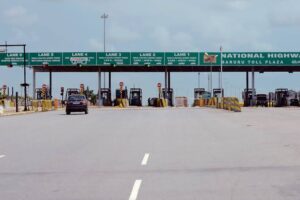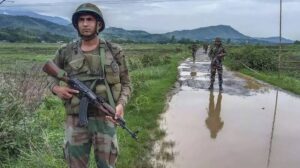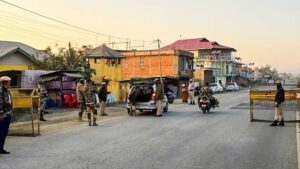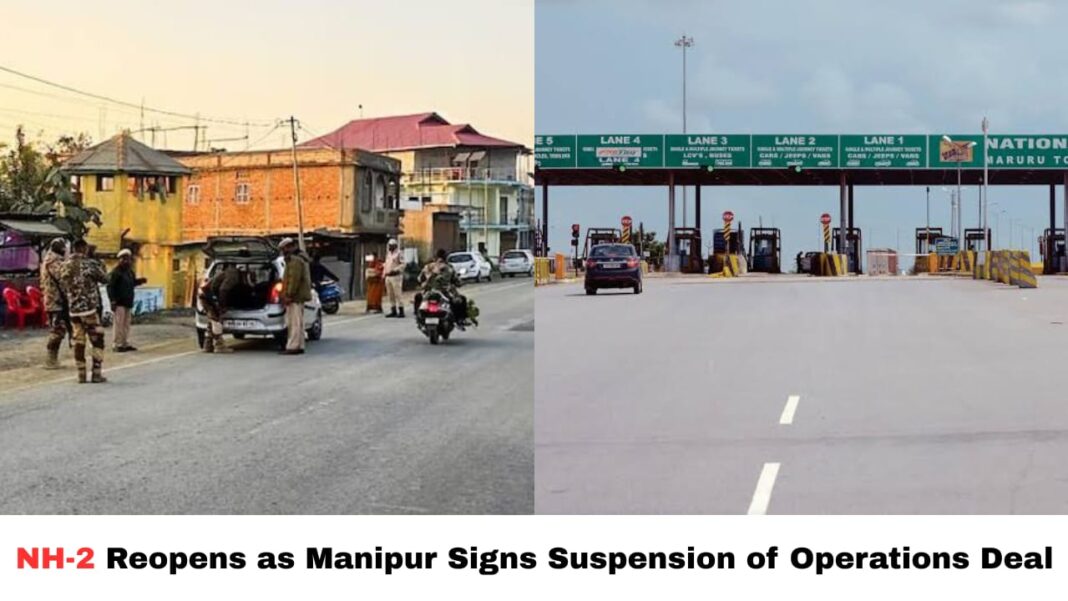Digital News Guru Manipur Desk:
Pact for Peace: Manipur’s Centre, State & Kuki-Zo Groups Sign Tripartite SoO Accord
The Ministry of Home Affairs (MHA), the Government of Manipur, and armed Kuki-Zo groups—the Kuki National Organisation (KNO) and the United People’s Front (UPF)—signed a renewed Suspension of Operations (SoO) agreement. This fresh tripartite accord marks a critical step toward normalcy following prolonged ethnic violence that began on May 3, 2023.
Key Components of the Agreement
- Reaffirmation of Territorial Integrity
All parties reaffirmed their commitment to preserving Manipur’s territorial unity—an essential requirement amid divisive regional tensions.

- Highway Rehabilitation: NH-2 Reopens
The agreement facilitated the reopening of National Highway-2 (NH-2), a crucial artery linking Imphal with Nagaland and other northeastern states. Closed since the onset of violence, the restored access now promises improved movement for commuters and supply chains. - Camp Relocation and Reduction
KNO and UPF committed to relocating seven designated camps situated near conflict-prone zones, along with reducing their total number—a step expected to lower flashpoint tensions. - Weapons Consolidation Under Security Oversight
All arms held within designated camps are to be transferred to nearby CRPF or BSF facilities, enhancing oversight and reducing risks of misuse. - Stringent Physical Verification of Cadres
Security forces will conduct rigorous physical verification of cadres in these camps, with orders to de-list any foreign nationals, aiming to prevent infiltration and maintain control. - Joint Monitoring Group for Oversight
The agreement established a Joint Monitoring Group (JMG) tasked with overseeing compliance. Notably, any violation could trigger a review or outright cancellation of the SoO pact. - One-Year Validity
The agreement’s terms are set to be in force for one year, offering a defined window to implement ground-level changes and foster stability.
Historical Background and Civil Society Backlash
The SoO framework has long been a mechanism to manage relations between peace-seeking insurgent groups and the state. Originally signed in 2008, renewed annually, it allowed armed groups like KNO and UPF to maintain camps under relative immunity—so long as they adhered to rules like refraining from violence and retaining strict arms protocols.
However, this arrangement attracted criticism. In July 2025, several civil society groups representing Meitei, Naga, and Thadou communities demanded the pact be abrogated, calling it flawed and frequently violated. They pointed to structural conflicts of interest—highlighting how signatory groups like KNO and UPF are also part of the JMG, making it unlikely they’d penalize themselves for violations.
Their call emphasized the need for a Constitutionally neutral arbitrator, independent enforcement, and federal oversight—not dependent on the militarized groups themselves.

Why This Renewal Matters Now
- Restoring Connectivity and Civil Life
The reopening of NH-2 stands out as an immediate and symbolic benefit—reactivating commerce, transportation, and daily life in a state strained by divisive violence. - Structured Path to De-escalation
The inclusion of tangible measures—camp relocation, weapon storage, cadre verification—represents a more actionable, accountable approach than past, passive renewals. - Leveraging Political Momentum
The pact coincides with an impending visit by Prime Minister Narendra Modi, signaling renewed federal will to address Manipur’s unrest proactively. - Confidence Building with Preconditions
With strict penalties for violation and external oversight, this SoO aims to balance concessions with accountability—potentially reversing the perception of the pact as permissive.
Potential Risks and What Lies Ahead
- Monitoring Bias and Implementation Gaps
Critics’ concerns about inherent conflicts of interest—where rebels have influence over the oversight body—remain relevant. The effectiveness of enforcement hinges on JMG’s impartiality and willingness to act. - Trust Deficit Among Communities
Decades of intercommunal mistrust won’t dissolve overnight. Meitei, Naga, and other communities will need concrete actions—not just agreements—to rebuild faith in equitable governance. - Security-First vs. Political Dialogue
While the current agreement emphasizes stability, long-term peace may require renewed political talks, local inclusion, and reconstruction—particularly in hill-valley interface areas.

Conclusion: A Fragile Truce with Possible Promise
The fresh SoO agreement marks a pivotal moment in Manipur’s stalled peace efforts—balancing symbolic confidence-building measures with pragmatic steps on the ground. By reopening vital infrastructure, streamlining insurgent camps, and enhancing oversight, the accord provides a foundation for healing—but not a guarantee.
Whether this framework leads to sustainable peace depends on transparent implementation, accountability, and addressing the deep-rooted fears of all communities. With national attention and a finite agreement term of one year, Manipur has a fleeting but crucial opportunity to transform ceasefire into reconciliation.
You May Also Read: GST Rate Rationalisation: What’s Cheaper, What’s Costlier from September 22








